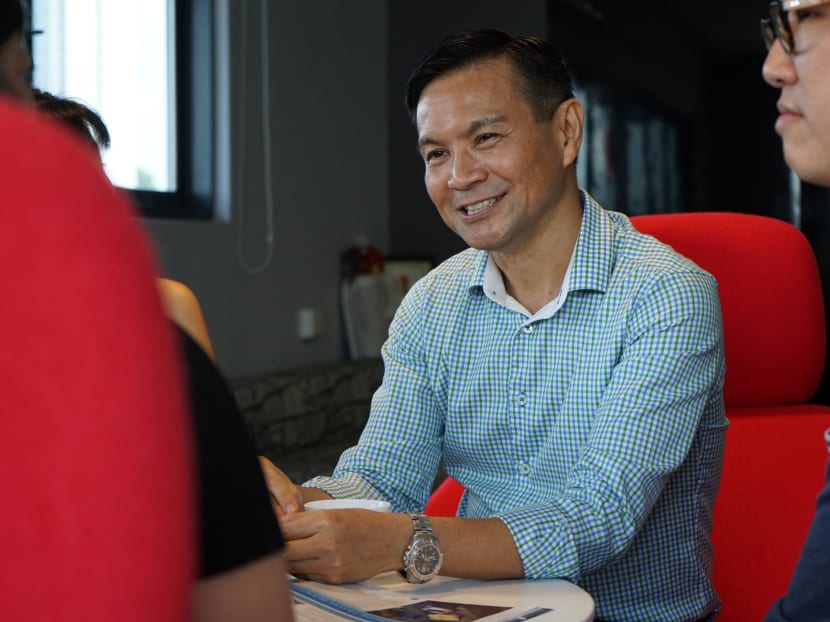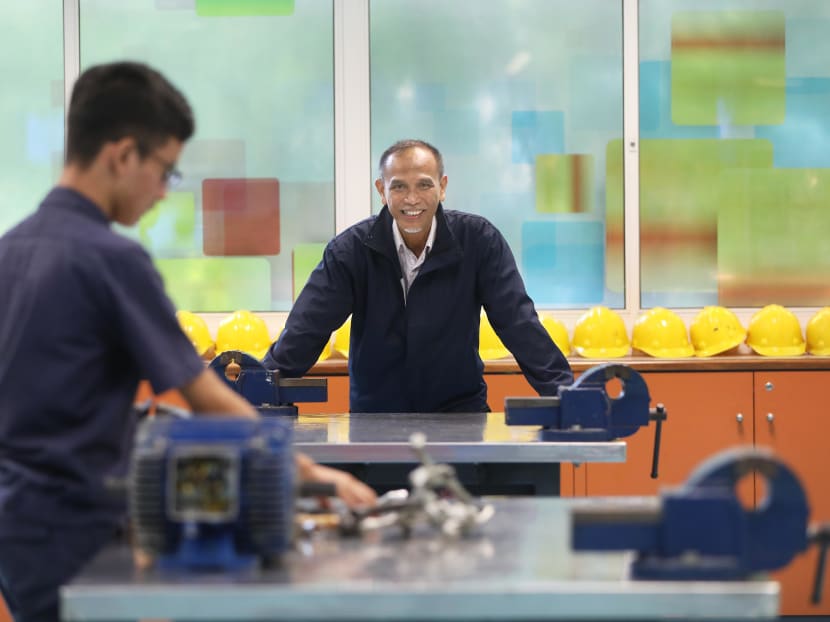Masterchef fan, teacher and motivator: Educators win accolades for fun, creative methods
SINGAPORE — He once asked students to design and build a mock-up of a cake so they could learn how to tailor a product to a customer’s wishes, while other times they participated in a gameshow style tutorial which required them to take turns to run to a board to write down answers to his questions.

Mr Teo Keng Ann, course chair in Business Innovation and Design at Singapore Polytechnic, was one of eight teachers who received the President’s Award for Teachers from President Halimah Yacob on Wednesday (Aug 29) at the Teachers’ Day Reception at the Istana.
SINGAPORE — He once asked students to design and build a mock-up of a cake so they could learn how to tailor a product to a customer’s wishes, while other times they participated in a gameshow style tutorial which required them to take turns to run to a board to write down answers to his questions.
Mr Teo Keng Ann, course chair in Business Innovation and Design at Singapore Polytechnic (SP), is one teacher who goes out of his way to make lessons fun and interesting for his students, who often turn up for his marketing classes not knowing what to expect.
The 53-year-old, a self-confessed “die-hard fan of the reality television show Masterchef”, said the cake designing tutorial exercise allowed the students to “really understand the customer’s needs and wants”, and “to sell the meaning of the product”.
“The learning outcome is to create a product with an emotional attachment to it,” he said.
For his creative teaching methods, Mr Teo was one of eight teachers who received the President’s Award for Teachers (PAT) from President Halimah Yacob on Wednesday (Aug 29) at the Teachers’ Day Reception at the Istana.
The teachers were chosen from a pool of 15 finalists for this year’s award. In total, 2,571 teachers were nominated by school leaders, teachers, parents, former and current students, said the Ministry of Education.
Recipients of the PAT are caring and nurturing educators, dedicated to the holistic development of their students, the ministry added. "They are committed to developing their students to their fullest potential and adopting innovative approaches in their lessons. As role models, these teachers embrace lifelong learning and are mentors to their peers in their learning journey."
Mr Teo, who has taught at SP for 20 years, credited his year-long training as an Emotional Intelligence (EQ) coach for helping him become a better educator.
He said: “I used to be an impatient or insensitive lecturer. After attending the (EQ) training, there were two components (that were taught) — increased empathy and to exercise optimism.”
While increased empathy taught him to be more patient with students and coach them more, exercising optimism allowed him to believe that they could do a good job, he added.
“I became more positive (as a result), and subconsciously, this helps in my teaching,” said Mr Teo.
Mr Teo conducts an EQ test on his students at the start of each semester, and he found many had low confidence levels and did not know which path they wanted to take in life.
Together with his students, he worked on a programme, Be Your Own Hero, to address those issues. After each session, Mr Teo would debrief the participants and link the learning points back to their EQ results.
Mr Justin Lee, a SP graduate and former student of Mr Teo, said: “He sees the EQ results and knows, for example, that a student has no confidence and is not stepping up.”
As a result, Mr Teo would “bring the student out of his comfort zone” during tutorials and encourage him or her to answer questions and make presentations to the class.
Mr Lee added: “He takes notice of every single student and makes sure we are doing the tutorials. And we remember the things he teaches, because he is very passionate about his subject.”
Unsurprisingly, due to his interesting, unorthodox methods, many of Mr Teo’s students stayed in contact with him long after they graduated from school.
He said: “It is a nice feeling to have (when students appreciate you and keep in touch) and the feeling is like old friends catching up.
“They have achieved things in their own way — becoming chefs, designers and their own bosses. It’s nice to be a part of their journey.”

For veteran mechanical engineering lecturer Khalid Kassim, 59, one of the finalists of this year’s President’s Award for Teachers, he likes to motivate students by instilling belief in themselves, and one another.
“The students that come to us, most of them come with a variety of personal problems… As an educator, I need to instill in them a continual desire for education for life,” said Mr Khalid.
The lecturer at the Institute of Technical Education College East — who has been an educator for over 30 years — has his students write out their goals at the start of the course. They have to carry the card with them every day for the next two years, and he added that they have to take an “oath”, “a simple promise to themselves that they will work hard towards achieving the goal that they set for themselves”.
Mr Khalid also got his students involved in a programme called the Student Home Outreach, where they use the skills they have learnt in their mechanical engineering course to help repair the homes of their coursemates who come from less well-to-do backgrounds.
He added: “What they learn in school is applied directly through this programme. For example when they are repairing the plumbing or basic electrical appliances, they apply the skills (they learn) to the real jobs that they do at their friend’s place.”
Fostering this tight kinship, said Mr Khalid, where each student can rely on others for help when they need it, is half the battle won.
He witnessed it himself when a student who was under probation “really turned over a new leaf” after bonding with his classmates. The student was eventually handed an outstanding student award in his course.
Mr Khalid, who has four adult children — two of whom are also educators — believes that students must give themselves a chance to succeed as “some of them are late bloomers”.
He added: “You must have that trust in yourself that you are able to do it. It’s not easy and it takes time to instill confidence. Once it clicks, you can see the progress of the students.”











